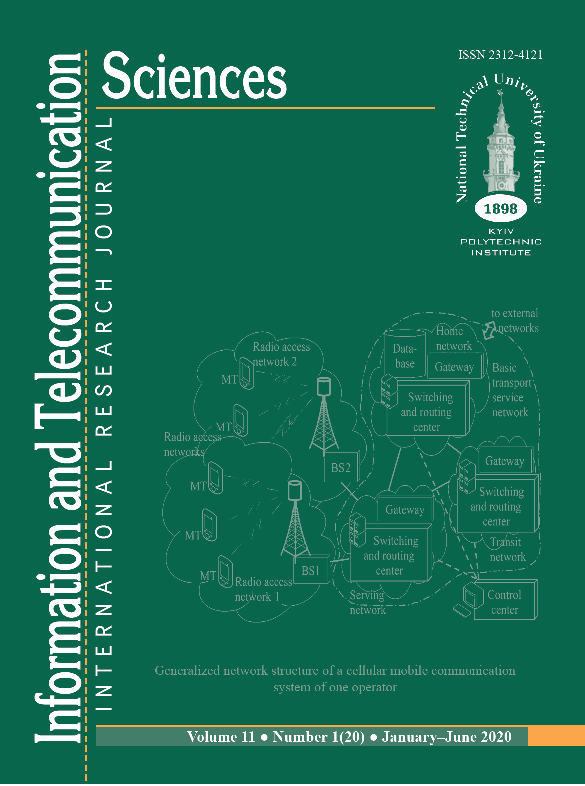STACKELBERG GAME EXPLOITATION FOR POWER MINIMIZATION OVER LTE-V MODE 4
DOI:
https://doi.org/10.20535/2411-2976.12020.71-76Keywords:
stackelberg game, LTE-V, platoon, interferenceAbstract
Background. Due to the great increase of accident into roads, vehicular communication becomes the focus of many researchers. Therefore vehicular communication is becoming an active topic of search. That’s why safety driving is the main concern of many researcher to mitigate congestion problems specifically following urban scenario. Due to the requirement of URLLC, we investigate in this paper the importance of power diminishing. In fact, power minimization is an interesting metric due to the requirement of high data rates.
Objective. The aim of the paper is to investigate power allocation into LTE-V system following a decentralized scenario.
Methods. The idea is to consider a platoon with a set of vehicles interacting together for network resources without the help of ENodeB. Power consumption minimization is a promising solution for interference diminishing since vehicles
communicate according to a decentralized way. In this regard the theoretical analysis is based on applying stackelberg game policy for power control in the way to minimize interference.
Results. We conclude that stackelberg game policy is a powerful tool for interference and power consumption management. Computer results highlight the efficiency of SK game for power allocation into a decentralized scenario.
Conclusions. Vehicular Autonomous communication attracted the attention of many researchers according to increasing number of congestion together with traffic problems. In addition, to ensure better safety we adopt platooning scenario which enables mitigations of many problems such as collisions, congestion. Inter-car communication is an interesting topic of search
to ensure safety into-roads. In addition, platooning has the potential to ensure safety with low energy consumption specifically towards urban traffic. In addition, LTE-V is a heuristic solution for vehicular communication where the connectivity is performed in a decentralized context without the requirement of the ENodeB.
References
J. Mei, K. Zheng, L. Zhao, Y. Teng, and X. Wang,” A Latency and
Reliability Guaranteed Resource Allocation Scheme for LTE V2V
Communication Systems,” IEEE TWC,vol 17, Issue 6,2018.
R. M.-Masegosa and J. Gozalvez,” A New 5G Technology for Short-
Range Vehicle-to-Everything Communications,” IEEE Vehicular
Technology Magazine, 12(4), 30-39.
T. Yu, S. Zhang, S. Cao, and S. Xu,” Performance Evaluation for
LTE-V based Vehicle-to-Vehicle Platooning Communication,”
arXiv:1810.00568.
G. Jornod, T. Nan, M. Schweins, A. El Assaad, A. Kwoczek and T.
Kürner,” Sidelink Technologies Comparison for Highway High-
Density Platoon Emergency Braking,” IEEE ITST, Lisboa, Portugal
H.Chihi, R.Zitouni, R.Bouallegue and A.Cherif,” Latency Aware Into
LTE-V2X Mode 4 System,”Sitis 2018.
Y. Jiang, H. Ge, M. Bennis, F.-C. Zheng, and X. You,” Power Control
via Stackelberg Game for Small-Cell Networks,” WCMC, Vol. 2019.
N. Sawyer, and D. B. Smith,” Flexible Resource Allocation in
Device-to-Device Communications using Stackelberg Game Theory,”
TCOMM.2018.
T. Zeng, O. Semiari, W. Saad, and M. Bennis,” Joint
Communication and Control for Wireless Autonomous Vehicular
Platoon Systems,” arXiv:1804.05290 ,2018.
Y. A. Al-Gumaei1, K. A. Noordin, A. W. Reza,K. Dimyati,” A
Novel Utility Function for Energy-Efficient Power Control Game in
Cognitive Radio Networks,” Journal.pone.0135137, 2015.
Zhiqiang Qi, Tao Peng, Jiaqi Cao, Wenbo Wang,” Stackelberg Game-
Based Optimal Power Allocation in Heterogeneous Network,”IEEE
VTC Spring 2018, Porto,Portugal.
Haitao Xu*, Lijing Zhang†, Xianwei Zhou*, Zhu Han,” Stackelberg
Differential Game based Power Control in Small Cell Networks
Powered by Renewable Energy,”IEEE WCNC 2018,Spain.
D. Goodman ; N. Mandayam,” Power control for wireless data,”IEEE
pers.comm.Vol 7,issue 2.2000.
S. Buzzi, D. Saturnino,” A Game-Theoretic Approach to Energy-
Efficient Power Control and Receiver Design in Cognitive CDMA
Wireless Networks,” IEEE J.of S. T. in Sig. Pro. Vo. 5 , Issue: 1 ,
Feb. 2011.
M. Abdulla, H. Wymeersch, » Fine-grained vs. average reliability for
V2V communications around intersections,”IEEE globcom 2017?
Singapore.
DAEIMI,
Downloads
Published
How to Cite
Issue
Section
License
The ownership of copyright remains with the Authors.
Authors may use their own material in other publications provided that the Journal is acknowledged as the original place of publication and National Technical University of Ukraine “Igor Sikorsky Kyiv Polytechnic Institute” as the Publisher.
ITS articles are published under Creative Commons licence:
- Authors retain copyright and grant the journal right of first publication with the work simultaneously licensed under CC BY 4.0that allows others to share the work with an acknowledgement of the work's authorship and initial publication in this journal.
- Authors are able to enter into separate, additional contractual arrangements for the non-exclusive distribution of the journal's published version of the work (e.g., post it to an institutional repository or publish it in a book), with an acknowledgement of its initial publication in this journal.
- Authors are permitted and encouraged to post their work online (e.g., in institutional repositories or on their website) prior to and during the submission process, as it can lead to productive exchanges, as well as earlier and greater citation of published work.

